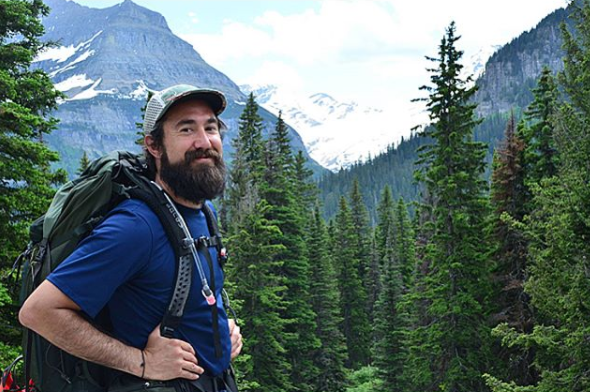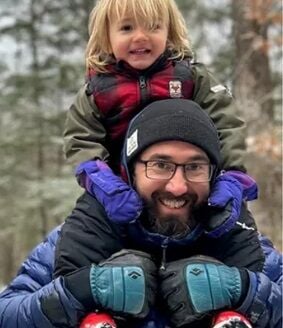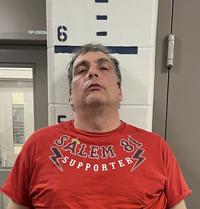Chris Roma grew up in the shadow of the White Mountains. He knew the trails intimately and had hiked them in all kinds of conditions.
But nothing in the forecast prepared him for what he encountered on the grueling Pemi Loop Trail 12 days ago.
When a sudden storm blew in, with near-hurricane-force winds and chest-deep snowdrifts, Roma fought to get back to the one thing that meant more to him than his beloved mountains: his 2-year-old son, Solomon.
Roma, 37, perished on Jan. 17, despite his own efforts and heroic attempts by rescuers on the ground and in the air to save his life.
In the days since, those who loved him have focused not on how he died but on how he lived — with passion, joy and love.
“Chris saw life through a different lens,” said Correy Hart, Roma’s best friend for more than 30 years.
Hart said his friend “loved and cared about everybody.”
“His own happiness was built off other people’s happiness,” he said. “He was a giver.”
They met when they played on rival basketball teams in elementary school — Roma in Thornton and Hart at Lin-Wood. The two stayed friends through high school, and they went to college together at NHTI.
Even after Roma moved to Florida for a while, they stayed close. “It was a bond that never broke,” Hart said. “We were brothers.”
His Zen
Growing up, Chris Roma was a gifted athlete, excelling at whatever sport he tried, friends said.
But it was after a serious motorcycle crash about 10 years ago that he found his passion for thru-hiking — long distance backpacking treks that would take him from one end of this country to the other.
The crash changed his life, friends said. “He started to appreciate things a lot more,” Hart said. “That’s when he got into hiking.”
Roma became an elite thru-hiker, conquering some of the most rigorous trails in America.
Thru-hikers earn a trail name. You can’t choose your own; it’s given to you by others.
Roma’s was Rafiki, the name of the mystical mandrill guide in “The Lion King.”
Friends say it was apt.
“He had this kind of spiritual connection to nature,” said Lillian Nemeth, a lifelong friend of Chris and his younger sister, Megan. “It empowered him, being in nature. That was a big piece of why he was out hiking that day.
“That was his Zen.”
It took Chris Roma just three years to complete the so-called Triple Crown of thru-hiking, Hart said. He hiked the Pacific Crest Trail, from Mexico to Canada, in 2016 in 162 days. The following year, he finished the Continental Divide Trail from Montana to New Mexico in 108 days, and in 2018, he completed the Appalachian Trail in 99 days. He did the Pacific Coast Trail again in 2020 in just 134 days.
For most hikers, climbing New Hampshire’s 48 4,000-foot peaks is a bucket-list goal to accomplish over a lifetime. For the best, the challenge is to hike all 48 in a continuous route; it’s called the Direttissima.
Last year, Chris did it in just over 10 days.
It wasn’t just his hiking prowess that drew people to Roma, Hart said. “You could be in a room with Chris and his energy would just light up the whole room,” he said. “It was so warm and inviting and loving.”
Miscalculation
The Pemi Loop, traversing eight summits, is a rigorous hike on the most favorable of days — it’s No. 2 on Backpacker magazine’s list of “America’s hardest day hikes.”
“Be ready for dazzling views and pitiless winds above treeline and go hard; even if you’ve lucked into a tailwind, this is likely a 16-hour trek, with miles of jouncing descent on shaky legs in the dark, even on summer’s longest days,” the magazine warns.
Chris Roma was no stranger to the Pemi Loop, having done it many times. He was dressed for ice and snow conditions when he left on Jan. 16, with microspikes and warm clothing. But he was traveling light, without snowshoes or a tent, so he could move quickly.
He started at 4 a.m. and planned to be out by 8 p.m., according to New Hampshire Fish and Game Lt. James Kneeland, who oversaw the rescue operation.
“Based on that, he was looking to average two miles an hour, when in essence, when he was 20 hours into it, he had averaged a mile or less an hour,” Kneeland said.
The snow was light but it was blowing around a lot and adding up quickly, Kneeland said. “Some of the drifts were waist- or chest-deep high,” he said.
Late Tuesday night, Roma called a hiking buddy, who called 911 to report that the hiker was in trouble. Later that night, Roma managed to place his own 911 call, which allowed rescuers to pinpoint his location, on the Bond Cliff Trail between Mount Bond and Mount Guyot.
The next morning, Roma got through by phone again, and Kneeland spoke with him briefly.
Kneeland tried to be “as upbeat as possible,” he said.
“Help is coming,” he told the exhausted man.
A helicopter was on the way, Kneeland told him. Was Chris out in the open, or covered in snow? Was he able to wave his hands?
He could tell Roma’s strength was fading and hypothermia was setting in. “My sense at that stage was that it was not good at all. I knew then if a helicopter rescue didn’t occur then, our success was going to diminish greatly,” Kneeland said.
A wall of clouds
First Lt. Matthew Pelletier of Derry, a Black Hawk pilot with the New Hampshire Army National Guard, was preparing to fly soldiers to a winter training mission when he got a call early Wednesday morning that a hiker was stuck on the mountain in desperate conditions.
With a five-man crew trained in hoist rescues, the Black Hawk launched from Concord at 7:18 a.m., headed for the Lincoln area. On the radio with Fish and Game, Pelletier learned that the weather conditions were worsening.
They tried from multiple directions to reach the area where GPS coordinates showed Roma had stopped.
“We knew that time was of the essence,” Pelletier said. “It being a hypothermia situation, we wanted to get to the point of injury as fast as possible.”
But as they got near the mountains, “It was pretty much a wall of cloud layer,” Pelletier said.
After making several passes, they returned to Concord for fuel and headed back north, trying to approach from the Twin Mountain side. “We climbed up to about 5,500 feet,” Pelletier said. “We were above the cloud layer. We wanted to look down and see if we were able to see any of the peaks. Unfortunately we weren’t able to make out any of the peaks.”
After a quick trip to Lebanon to fuel up the aircraft again, they returned to the mountains a third time. “We just unfortunately could not get to where we needed to be,” Pelletier said.
The Whites, he said, “make their own weather.”
“It’s different every time, when you go up there,” he said. “It’s a unique place.”
Valiant attempt
Hart, Roma’s longtime friend, got a call that Tuesday night that Chris was in trouble on the Pemi Loop trail. As he drove to Lincoln Woods to meet Fish and Game officers and Chris’s family, Hart said, “There wasn’t ever a thought in my head that he wasn’t coming off that mountain.”
But by the next morning, as they watched the helicopter repeatedly trying to reach the ridge, his hopes began to dim. “I knew the odds are now starting to count against him, hearing how bad the weather was,” Hart said.
The marker board at the Lincoln Woods lodge the previous day had predicted zero degrees for a low and 10- to 20-mph winds, Hart said. But he said, “In the Whites, sometimes the weather itself just changes, and it went from what it was to 100 mile-per-hour winds and up to negative-50-degree temperatures” with the wind chill.
“Chris endured that all through the night.”
Fish and Game conservation officers and volunteers from search and rescue teams had been struggling to reach Roma on foot since 2 a.m. Wednesday. When they finally reached him around 5 p.m., he was dead.
Even as word reached the family gathered at the base, Hart said he still didn’t believe it. “There was something inside me that didn’t want to believe it,” he said. “In my head, Chris is up there in an igloo.”
For the rescuers’ safety, the decision was made to wait until Thursday morning to recover Chris’s body. When dawn broke, the weather had improved enough to send a different National Guard helicopter crew to retrieve his remains.
The family and Hart drove to Bretton Woods to meet the helicopter. As they turned into the parking lot, Hart said, “The sky opened up and the sun came out and the beaming of the sun was coming down onto the parking lot and onto us.”
“That’s Chris,” Hart told his best friend’s parents. “He’s smiling at us right now, saying he’s OK.”
“We all started crying,” he said.
“I felt that was Chris going home,” Hart said. “You always hear that God always needs his toughest soldiers, and that was Chris. I feel Chris was needed more spiritually right now than in physical form.
“And I’m trying to find peace in that,” Hart said.
A few days ago, Roma’s parents gave Chris’s cell phone to Hart. Inside, he discovered an app that tracked Chris’s movements that day.
He broke down as he realized that Chris had tried to cross over to the Mount Zealand trail, where he could have made his way to a hut with a woodstove. But in the blowing snow, “He just missed it,” he said.
“Honestly, I bawled my eyes out yesterday, seeing it. He knew, and he was almost there,” Hart said.
“There was so much going against him,” he said. “He fought till his last breath. He was trying to get off that mountain to get back to his son.”
Lesson to all
The debriefing when the National Guard crew got back to Concord was “somber,” Lt. Pelletier said.
He wants Roma’s family to know: “We did everything that we could.”
“We absolutely exhausted all of our options to get to the individual,” he said. “Ultimately, Mother Nature didn’t allow us to get to where we needed to be.”
Fish and Game conservation officers respond on an average of 170 to 180 hiker rescues a year, according to Major David Walsh, the agency’s assistant chief of law enforcement.
Every year, some turn into recovery missions.
According to Fish and Game records, eight hikers died in 2019. In 2020, when more people took up outdoor pursuits during the pandemic, 17 hikers died, and in 2021, it was 18. Sixteen died in 2022, and 11 last year.
Most hiker rescues happen between Memorial Day and Columbus Day, Walsh said. There are fewer such missions during the winter, “but they’re more dangerous,” he said.
Someone can die of hypothermia in just hours. But reaching them becomes an arduous task for rescue teams. “However long it took them to get there, it’s going to take rescuers as long,” he said.
Roma, Walsh said, “was as knowledgeable as any of us.”
What happened to him is a lesson for all who love and respect New Hampshire’s wild places, he said.
“The takeaway is it can happen to any of us if we let it,” Walsh said. “If the conditions are not what you expect, just turn around and say: Not today.”
“The mountain will be there tomorrow,” he said.
A great spirit
In addition to his son, Roma is survived by his parents, Barbara and Hayden Roma; his sister Megan Roma-Sullivan, her husband Michael and their son; and countless friends. It was only after his death that his family began to realize how many lives Chris had touched, and changed, as he hiked the most challenging treks.
“We’re hearing all these stories from so many people he met while he was out on the trail, or someone he encouraged to hike,” said Lillian Nemeth, the family friend.
“One hiker from the West Coast reached out just to say he had such an incredible time with him and what a great spirit and person he was,” Nemeth said. “He wanted to write a letter for his son, just to be able to know his dad through other people.”
Hart said he’s heard the same thing from numerous people since Chris’s death: “Chris always called them at the right time in their life.”
“I’ve had people personally tell me Chris has talked them out of suicide attempts,” he said. “They’re pained because Chris saved their lives and they feel this guilt because they couldn’t save his.”
Family and friends from around the country planned to gather on Saturday in Lincoln to share stories about Chris and celebrate his life.
Roma had recently launched his own guide business, NorthEast Trekking Co. On his website, he wrote that he wanted to serve hikers “looking for more than just a workout and a view.”
“The hiker that is looking for the life lessons and experiences one gets through hiking. I experienced a lot of learning the hard way, and my goal is to educate and inform you about the dangers of the wild, the trials and tribulations, and the importance of sustainability,” he wrote. “I want to show you that if we take care of nature, nature will take care of us, mentally and physically.”
Love in hard times
The last time Hart talked to Roma was the Sunday before the tragedy. It was a tradition they had, what they jokingly called “accountability Sunday,” a call to catch up and check in that could last for hours.
“He sounded motivated to conquer the world, as he always does,” Hart said.
After Chris died, Hart found his friend’s calendar, filled with goals he wanted to achieve this month — starting with the Pemi Loop. “He did everything at a very high level,” he said. “That was Chris. He could battle any adversity.”
That was one of the most inspiring things about being around him, Hart said. “He always showed you something in yourself when you couldn’t find it on your own.”
“Seeing other people happy made him happy, and he did everything he could to help you achieve whatever that was.”
Chris always told people his greatest achievement was his bond with his little son, Solomon, friends said. “They did everything together,” Hart said. “It was beautiful to see that relationship.”
Roma and Solomon’s mother were no longer a couple, but they remained close friends and lovingly co-parented their son, Hart said.
Those who loved Chris Roma say they’ll pour that love onto his little boy now.
Nemeth organized a GoFundMe campaign for Roma’s son that has raised nearly $80,000 from more than 1,000 people. She wants Solomon to know what a difference his father made in his short but brilliant life. “He knew so many people and impacted their lives so positively,” she said.
Because of that, she said, Solomon “has a village, and a global family, to help share stories about his dad, and that will be there for him.”
What would Chris tell his loved ones trying to make sense of his loss?
“Chris would want us to do everything and anything for his son and his family,” Hart said. “And of course always to love one another, support one another, even in our hardest times.
“Because that’s what he did.”



















